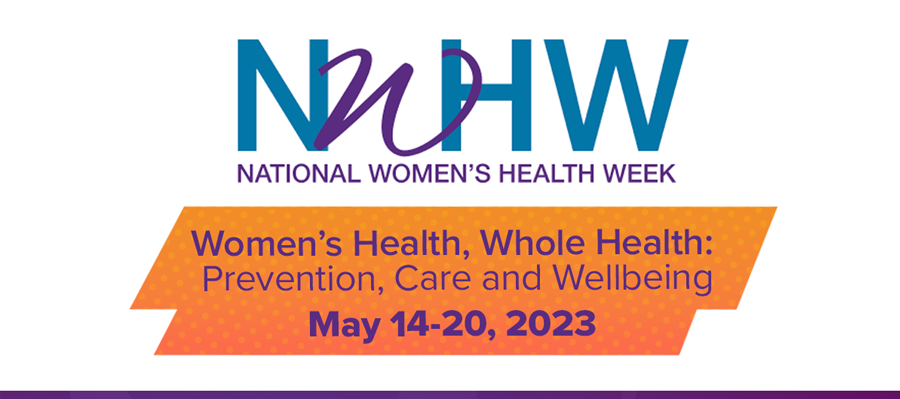Embracing Wellness Week for Women 2023
Each year, National Women’s Health Week commences on Mother’s Day, serving as a dedicated occasion to emphasize the significance of women’s health. This observance aims to inspire women and girls to prioritize their overall wellbeing.
Caring for oneself encompasses the physical, mental, social, and emotional aspects of health. There are numerous actions that can be taken, ranging from adopting healthy habits to ensuring regular healthcare appointments. By engaging in healthy behaviors, you can receive the necessary care for your wellbeing.

Engage in Open Dialogue with Healthcare Providers:
Regular check-ups hold great importance. Consult with a healthcare provider:
- To understand the recommended screenings and examinations, as well as their appropriate timings. Additionally, explore the preventive services covered for women and other cost-free services available.
- If you are pregnant or within the first year after childbirth, promptly seek care from a healthcare provider if you experience any urgent maternal warning signs.
- If something feels amiss or raises concerns. Schedule an appointment or reach out to your doctor or nurse through phone or email. Make a note of any questions or issues you may have and bring them up during your appointment.

Embrace a Healthy and Balanced Diet
Maintaining a healthy and balanced diet is an essential component of a wholesome lifestyle.
- Prioritize nutrition by following a healthy eating plan that includes fruits, vegetables, whole grains, fat-free or low-fat dairy products, and lean meats. You can also incorporate lactose-free alternatives, fortified soy beverages, and yogurts. Your eating plan should be low in salt, saturated and trans fats, as well as added sugars.
- If there is a possibility of pregnancy, ensure a daily intake of 400 micrograms of folic acid. Adequate folic acid consumption before and during pregnancy reduces the risk of major birth defects of the brain or spine in infants.
- Limit excessive alcohol consumption. Drinking in moderation, which amounts to up to one drink per day for women, is recommended. Assess your drinking habits and establish a plan to reduce alcohol intake.

Engage in Physical Activity
Physical activity plays a vital role in improving overall health.
- Strive to be more active and reduce sedentary time. Even small increments of physical activity contribute positively. Begin with small steps and gradually work your way up to a total of 2 hours and 30 minutes per week. You can distribute this time in smaller daily sessions, such as 20 to 30 minutes each.
- Take advantage of spring and summer weather by venturing outdoors. Physical activity is one of the most effective ways to maintain good health, including reducing the risk of heart disease, which is the leading cause of death among women.
- Aim for at least 2 hours and 30 minutes of moderate-intensity aerobic activity per week for adults. This can be divided into manageable sessions.
- Incorporate strength training exercises that target all major muscle groups at least two days a week.
- Women, particularly older individuals, are prone to falls. Strengthening exercises and activities that enhance balance can help reduce the risk of falls.

Prioritize Mental Health
Mental health significantly contributes to overall wellbeing.
Actions to consider:
- Take a few moments to relax and take deep breaths. Even dedicating five minutes to self-care can make a difference.
- Engage in physical activity such as walking, stretching, or exercising.
- Foster connections with others. Reach out to friends and family members.
- Seek support from trusted organizations, friends, or family members. Discuss your emotions with others, including members of your faith community or clergy.
- Consult a healthcare provider if you need assistance with your mental health. You can schedule an appointment with a counselor or therapist.
- If you or someone you know is struggling or in crisis, contact the 988 Suicide & Crisis Lifeline for immediate help through calls, texts, or chats.
- Allocate time to unwind and partake in activities that bring you joy.
- Maintain both your mental and physical health. Research indicates that positive mental health is associated with improved overall health and wellbeing. Undertake essential steps to cope with stress and enhance your wellbeing by seeking the support you require.

Embrace Healthy Behaviors
For individuals who menstruate, maintain healthy habits during your period, such as regularly changing menstrual products and monitoring your cycle. Educate yourself about your menstrual cycle and address any concerns with a healthcare provider. Local health or social service organizations can provide assistance with menstrual product affordability, if needed.
Menopause signifies a natural transition in a woman’s life when periods cease. Menopause is confirmed when there has been no menstrual period for 12 consecutive months. If you are experiencing menopause, explore strategies to alleviate associated symptoms.
Take care of your body:
- Enhance your emotional wellbeing by promoting physical health. Consider the following suggestions:
- Employ preventive measures to safeguard against illness. Maintain regular health appointments and ensure you receive recommended vaccinations.
- Prioritize adequate sleep for overall health. Sufficient sleep positively impacts your daily functioning. Adults should aim for a minimum of 7 hours of sleep each night. Establishing good habits, including maintaining a regular sleep schedule, even on weekends, facilitates restful sleep.
- Avoid the misuse of illegal drugs or prescription medications. Refrain from consuming someone else’s prescription. Substance use treatment is accessible, and recovery begins by seeking help.
- Steer clear of smoking, vaping, and other tobacco products. Many individuals have successfully quit smoking, and it is attainable for you too.
- Allocate time for activities that help you unwind and enjoy yourself.
- Cultivate meaningful connections with others. Quality relationships and a sense of belonging are vital for both physical and mental health. Share your concerns and emotions with trusted individuals.
- Seek out local support groups, which provide a safe space for comfort and camaraderie. Remember, you are not alone.
- Recognize when you require additional assistance. If stress interferes with your daily activities for more than two weeks, or if you are contemplating suicide, reach out to someone who can provide help. Psychologists, social workers, and professional counselors are available resources.
- If you or someone you know is struggling or in crisis, immediate help is accessible by calling or texting 988, or by engaging in a chat through the same number.
- If you are experiencing violence, seek support. Visit the National Domestic Violence Hotline or dial 1-800-799-7233 (TTY 1-800-787-3224).



